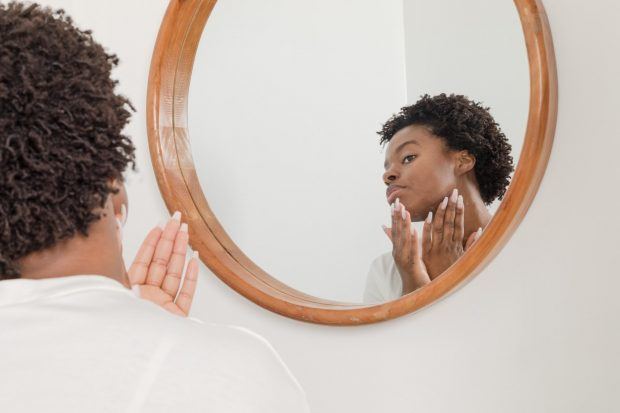Flawless skin is always the goal, but sometimes we find ourselves having to dodge occasional adult acne outbreaks, which often then contribute to unwanted dark spots. Hyperpigmentation is one of the most frustrating and common skin issues to treat.
Hyperpigmentation is the term used to describe spots or patches of skin that are darker than the surrounding areas. Essentially, everyone’s skin heals differently, and one of the ways it responds to injury or inflammation is by overproducing the pigment called melanin. These areas of abnormal melanin deposits manifest on the skin as discolouration, and fall under what we call post-inflammatory hyperpigmentation (PIH).
Though hyperpigmentation can affect everyone, people with darker skin tones are more prone to experiencing it, as they have more active melanocytes, which are also known as pigment-producing cells. So for those with darker complexions, any injury or irritation is more likely to result in excess pigment when it heals. For this same reason, hyperpigmentation is not only more common in darker skin tones, but also more severe and harder to treat.
I believe that effective skincare for darker complexions doesn’t need to be scary or complicated. Below he shares how to effectively treat hyperpigmentation, whether it’s at home or in-clinic, as well as how to prevent this problem in the future.
How do you treat hyperpigmentation at home?
When it comes to the at-home treatment, you have to be careful not to cause any additional inflammation. The good news is, however, that it’s treatable – and you don’t have to switch to using exclusive products for darker skin to get results.
I suggest using advanced formulations that are able to properly address your most common issues, including lifting pigment, reducing inflammation, and repairing the skin barrier.
When looking for products to combat hyperpigmentation look out for these three main ingredients; kojic acid, niacinamide, and vitamin C. Each one of these ingredients has its own superpowers.
Kojic acid not only exfoliates your current dark spots away, but also works as a tyrosinase inhibitor. It blocks the excess production of melanin and prevents hyperpigmentation before it even happens. A form of vitamin B3, niacinamide makes the skin produce more ceramides. This helps keep your skin’s barrier function intact, so it can do its job and ward off inflammation.
Meanwhile, an antioxidant with brightening powers, vitamin C protects the skin from free radicals, while also diminishing the signs of aging like sun spots.
I recommend:
- NEOSTRATA Dark Spot Corrector
- DERCA Anti-Pigment Moisturiser
- DERMALOGICA Powerbright Overnight Cream
- Sk.in gloss | radiant shot
In-clinic treatments for hyperpigmentation
A combination approach to skincare gives the best results. This means using products with active ingredients, as well as in-clinic treatments. These include superficial chemical peels, which are mild but deliver fast results, micro-needling, and laser treatments.
When these treatments are carried out by an aesthetic medical practitioner, dermatologist, or medical aesthetician with experience in treating darker skin tones and using the right acid concentration or depth of the needle or laser, they can be incredibly effective. As with any ‘tweakment’ it’s important to do your research first.
Is there any way to prevent hyperpigmentation?
There is a myth that darker skin doesn’t need SPF protection. Yes, more melanin does mean a greater degree of inherent sun protection, meaning you won’t burn as easily. However, this doesn’t decrease risk altogether. The truth is you need to wear SPF every day even if your skin is darker. Doing so will prevent dark spots and hyperpigmentation in addition to skin cancer.
SPF protection really is your first line of defense. If you’re treating hyperpigmentation without it, then you’re only working against your progress.
I recommend:
- HELICORE Advanced Gel SPF 50
- COLORESCIENCE Sunforgettable Total Protection Face Shield SPF 50
- HELIOCARE 360 Water Gel SPF50
- LAMELLE Helase Photo-Repair Cream 50
Visit Skin Miles and sign up for a free Face2Face Assessment. You will receive personal recommendations from me for your skin type or skin concern.
Want to know more?
When we think about the effects of sugar, we primarily focus on how it affects our weight and physical health. However, you might be surprised to hear that sugar can also trigger hyperpigmentation. Whether it’s prematurely aging us or causing flareups, sugar isn’t the kindest to our skin.






![women [longevity live]](https://longevitylive.com/wp-content/uploads/2020/01/photo-of-women-walking-down-the-street-1116984-100x100.jpg)









